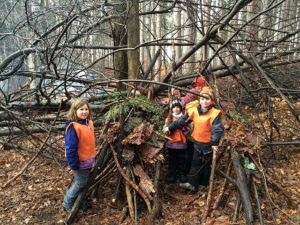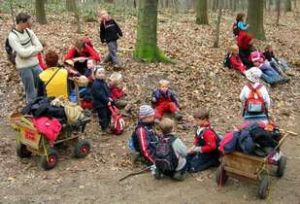 To boost the immune system of young children, as well as improve their skin and gut microbiomes - send them out daily to play in a natural environment. That means outdoors in a natural park-like setting with grass, plants, soil, and trees. Yes, germs and dirt!
To boost the immune system of young children, as well as improve their skin and gut microbiomes - send them out daily to play in a natural environment. That means outdoors in a natural park-like setting with grass, plants, soil, and trees. Yes, germs and dirt!
Finnish researchers found that replacing the gravel and pavement in urban daycare playground areas with natural forest-type vegetation (forest plants, shrubs, sod, mosses, and peat blocks for climbing) resulted in beneficial changes to young children's immune systems, and skin and gut microbiomes. This happened in just one month!
The researchers studied 75 children (3 to 5 years old) at 10 daycare centers in 2 Finnish cities (urban areas). Four of the daycare centers had their gravel/paved playgrounds turned into a forest-type natural area (where the children played), 3 daycare centers weren't changed (kept the gravel/pavement), and 3 daycare centers were already nature-oriented with children visiting forests daily. All children spent the same amount of time outside each day.
An important finding was that after 28 days the skin and gut microbiomes (microbial communities) of children playing in the transformed forest-type playgrounds had shifted to become more similar to children attending nature-oriented daycares. This change was also reflected in their immune systems: they developed a higher ratio of anti-inflammatory proteins to pro-inflammatory proteins in their blood (this is good).
The researchers point out that getting exposed to all the microbes in a natural forest-type setting (environmental microbial diversity) is beneficial. On the other hand, playing outside on man-made landscaping materials does not result in beneficial changes. Translation: playing outside in the dirt and plants is good for you.
From Medical Xpress: Replacing asphalt with forest-type plants at daycare centers found to strengthen immune defenses in children
A team of researchers affiliated with multiple institutions in Finland and one in the Czech Republic found that replacing asphalt in play areas at daycare centers with natural vegetation can lead to stronger immune defenses in the children at the centers. In their paper published in the journal Science Advances, the group describes removing asphalt from play areas at several daycare centers and replacing it with forest floor vegetation, and what they found when they tested the children who attended the centers.
Prior research has suggested that one of the reasons for increased rates of autoimmune diseases in many parts of the world, such as inflammatory bowel disease, type 1 diabetes, eczema and asthma, is lack of exposure to elements that push children's immune systems to respond. The thinking is that repeated exposure to natural elements like dust, dirt and pollen while young strengthens the immune system. Researchers have noted that children living in some urban areas are most at risk of missing out on such exposure and that might explain their higher rates of autoimmune diseases. In this new effort, the researchers sought to test this theory by changing the environment in which such children play—playgrounds at daycare centers in urban areas.
To learn more about the possible impact of exposure to natural elements, the researchers received permission to replace the asphalt at several daycare centers in two of Finland's major cities—and then to replace it with turf dug up from forest areas. In addition to forest floor sod, the researchers also brought forest shrubs, bushes and mosses. The children in the centers were then encouraged to play in the upgraded areas during their time outdoors. The children were all tested prior to installation of the natural material and then again 28 days afterward, for immune system markers.
The researchers acknowledge that their test group was small—just 75 children were participants—but suggest their striking results warranted publication of their findings. In addition to a large (a third higher than a control group) increase in skin biome, the researchers found positive changes to proteins and cells (regulatory T cells and anti-inflammatory cytokines) that have been found to be present in people with a more robust immune system. They suggest more work needs to be done to prove the benefits of such a change in the childhood environment and then to push for changes to be made.


